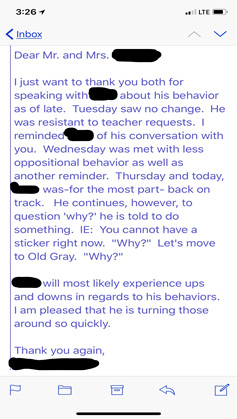If your child is being defiant in class or at home, read this because it will probably be the most important thing you read all day.
A client of mine sent me the email below today.

Initially, the problem seems pretty simple right? The child is obviously being defiant in class. He should just do what he’s told without questioning his teacher or any authority figure for that matter. He should follow the directions because she is the teacher and she said so. End of story. That was the purpose of this email right? The teacher wanted the child to fall in line and since he wasn’t doing that she notified his parents so that he would be punished accordingly.
On the surface, I think that’s what we all would have thought. Truthfully, that’s what his mother thought. Her concern was that her child, who was always a sweet and respectful little boy, was now becoming defiant in school.
She realized though, that this was a stretch. After all, he wasn’t being rude or disrespectful at home. He wasn’t being rude or disrespectful at OT or Speech either. This email was really bothering her and that’s when she showed it to me. Initially, I had the same reaction. Why is he being in defiant in class all of a sudden? That’s when it clicked. Maybe he wasn’t being defiant. Maybe we needed to dig beneath the surface to realize what was really going on. It was time to change the narrative.
This is a second grade special needs student with a host of learning disabilities which I will not disclose for privacy reasons. While he’s very intelligent, he has problems processing and remembering facts. He’s capable of learning but it’s as if his brain is in a very dense fog and he’s trying to find his way around. He knows what to do but he can’t seem to find his way quickly enough.
While I was thinking about this, I thought back to a few things in my own life. I thought back to kids that I would babysit. There’s that age from around 3-6 where no matter what you say, the child will always ask you “Why?” At that age, kids aren’t asking to be annoying. They’re asking because they are genuinely curious about the world around them. They want to know how things work and why they are the way that they are. It helps them to learn. It gives them the background knowledge that they so desperately need to put the pieces of the puzzle together in life. It helps them to make real world connections. The problem is that we don’t talk about this. Nobody tells you how important the “why stage” is. Then, I started to think about my adult life. I started to think about a conversation I had with my trainer when I first met him. I remember being so angry that our first session, we didn’t work out at all. He had a completely different agenda than I did and it made a world of difference. He took the entire session to ask me a host of questions about fitness and nutrition, mostly nutrition. When he gathered all of his information, he took a few minutes to process it all and to go over his notes before telling me what our plan was going to be going forward. Before he would tell me the plan though, he said that he wanted me to understand the why first. I remember being so annoyed that he was wasting my time when we could have been working out. The why was simple wasn’t it? I needed a nutrition and exercise plan that was going to get me to my goals. You tell me what to eat and how to workout. I do it. I get the results. Game over. Right? Wrong! You see? He was way ahead of me. He realized that I needed to know and fully comprehend how eating the way he wanted me to eat and working out the way he wanted me to train would affect me mentally, physically, and emotionally. I needed to understand how each thing he was asking me to do worked together to get me to where I wanted to be. I needed to know this for when I wanted to blow off the gym or give in to that ice cream sundae. The “Why” was literally everything!
Once I realized all of this, I asked the mom some questions. Is he being rude when he asks you why at home? The answer was no. Do you give him a reason why? The answer was yes. Has he been defiant with you? The answer was no. I thought about my own sessions with him. In the two years that I have worked with this client, I have never once had an issue with him. Does he ask me why sometimes? You bet. Do I answer? Every single time! Once he has a valid reason, he moves on. It’s pretty simple. So why now? Why is he asking so many why questions now? That’s when I really cracked this. I talked to mom about my own experiences babysitting and teaching in the younger grades and why not everyone can handle those age groups. I asked her about the email. I asked her what would have happened if her son came home today and told her that he didn’t get a sticker. I wanted to know what the first question she would ask was. You already know what the answer is. She would have asked “Why”? Then I asked if her son had ever gone through the “why stage”. She was quiet for a minute. I watched her eyes light up. He had never gone through the “why stage”. Her son had just hit a developmental milestone. This was great news!
Why do I care so much? Why am I rambling? Why questions help us to understand the world around us. They help us to make connections to the real world. They help us relate to characters in a story. They help us to become better writers. They help us to analyze and understand history. Why questions are essential to our comprehension across the board. Not only that, but they are essential to our survival. Why shouldn’t I touch the stove? Why can’t I have cake and candy all day long? Why do I have to eat my vegetables? Why do I have to be nice to people? Why can’t we blow your entire paycheck on video games? Why do I have to be home by 10pm? All of these questions require valid answers as we go through life so that we can make wise choices. Questioning authority is natural as well and history has shown us time and time again that it is necessary to ensure our safety. Can you imagine what the world would be like if all the children always did what they were told without asking why? I certainly wouldn’t want to live in a world like that.
I understand that getting asked why over and over can seem annoying. The next time an issue like this occurs though, I urge you to dig deeper. Realize that there is probably a much more profound reason behind the question. Have patience and answer the why.








